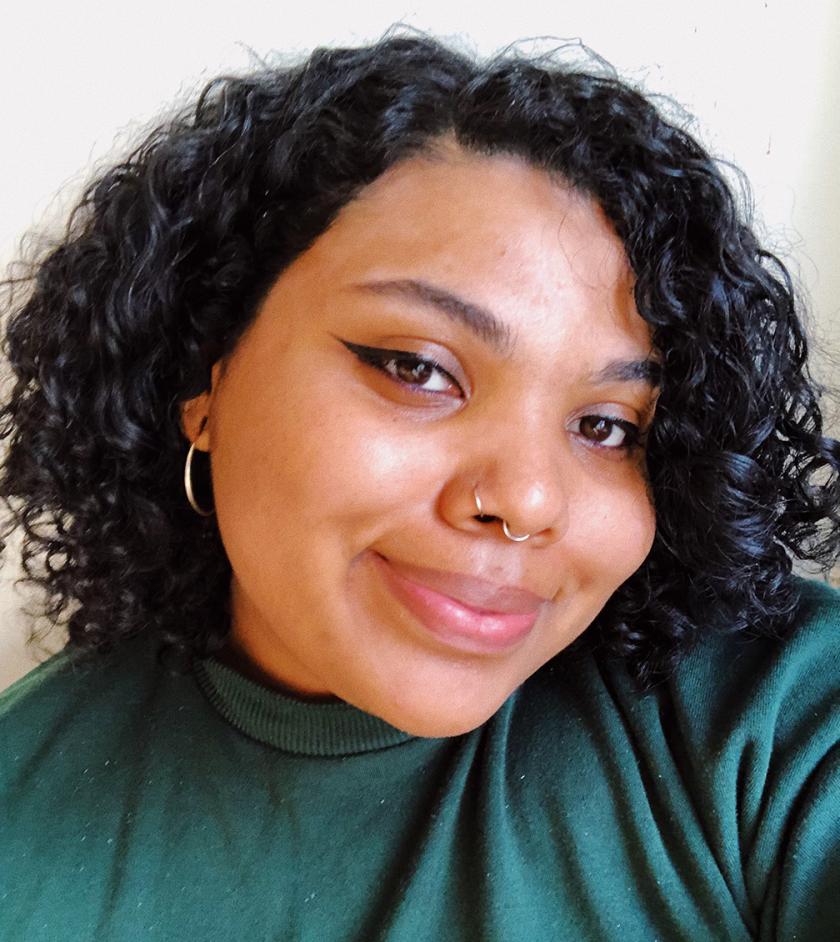
Eight iSchool master's students were named 2021-2022 Spectrum Scholars by the American Library Association (ALA) Office for Diversity, Literacy, and Outreach Services. This "Spectrum Scholar Spotlight" series highlights the School's scholars. MS/LIS student Kaila Rain Thomas earned her BA degree in American history from the University of San Francisco, with a focus on African American history, culture, and politics.
Why did you decide to pursue an LIS degree?
I was an intern at the Freedom Archives during the last half of my senior year of college and became an employee after graduating. It was obvious that I enjoyed the work and was really good at it, but I had no idea what I was supposed to do next in terms of making it a long-term career. I actually hadn't considered pursuing an LIS degree until my supervisor suggested it. It made sense, and I had a very supportive and encouraging community. When the pandemic started, I left the city to move in with my family and help them out with the sudden major changes. This is when I decided it was the perfect time to start pursuing an LIS degree.
Why did you choose the iSchool at Illinois?
I want to say that I chose the iSchool because it's the number one program in the nation. However, I chose it because my supervisor and two of our colleagues attended the iSchool, and I wanted to be like them and keep the accidental tradition alive. No regrets.
What particular LIS topics interest you the most?
I'm particularly interested in archives and special collections. There have been a few captivating conversations about intellectual freedom, neutrality, and diversifying collections in my classes. As an emerging archivist who hopes to engage with my community, I think these are really important conversations to keep in mind.
What do you do outside of class?
When I'm not in class, I'm working on my first big project as a public historian, A Grandfather's Legacy Project. It's an archival project dedicated to preserving the legacy of my grandfather, Ronald Williams, and the Alabama Black Liberation Front. I built the website during my first semester of graduate school. I took the summer off to travel up and down the west coast to speak with people who knew my grandfather and were involved in his struggle for freedom. Now I'm reading his old letters and personal writings, hoping they'll reveal something important or fill in a gap or two in my research. I'm also hoping to have a solid timeline down in the next few months, in the style of a crazed investigator with papers stuck to walls and connections illustrated with pins and red string.
When I'm not working on my project, I'm usually trying to get through an audiobook, FaceTiming my three-year-old brother, or chatting with my best friends who all live in different states. I recently moved to my family's farm in the Pacific Northwest, so I've also been spending some time with my relatives and enjoying the rain.
What does being a Spectrum Scholar mean to you?
At times, I still can't believe I'm a Spectrum Scholar. But I'm thrilled and honored to have been chosen to be a part of this year's cohort. It's been a real joy connecting with fellow Spectrum Scholars. They've all been so kind, caring, gracious, and welcoming. Being a part of the Spectrum community gives me the sense of belonging I desperately needed in this program. As a young Black woman coming into a field that is predominantly white, feeling like I belong here and having a community to back me up and uplift me is really special. I have so much to learn, and I'm so happy that I get to do that with the most wonderful and inspiring people.
What career plans or goals do you have?
My only real goal right now is to continue working on A Grandfather's Legacy Project and write a book. This story matters. Beyond that, I just hope that I can continue doing what I love (public history). It sounds crazy saying this, but I'm just going with the flow. I've followed my heart throughout this entire process, and it's worked out pretty well for me. I believe this is what I'm meant to do, so the rest is easy.